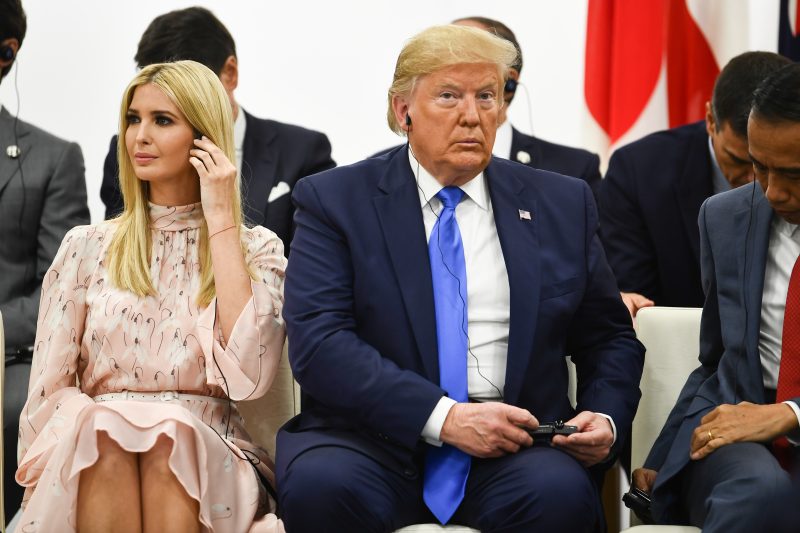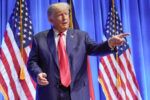‘Back on track’: Trump, Xi agree to resume trade talks
Trump grabbed the G20 headlines with a surprise tweet saying he was open to meeting Kim Jong Un at the demilitarised zone between North and South Korea (Brendan Smialowski)
Osaka (Japan) (AFP) – US President Donald Trump said trade negotiations with China were “back on track” after “excellent” talks Saturday with his Chinese counterpart Xi Jinping in which Washington reportedly agreed to hold off on new tariffs.
The crunch talks on the damaging trade war between the world’s top two economies came on the sidelines of a meeting of the G20 in Japan’s Osaka, with all eyes on whether the pair would agree a truce.
“We had a very good meeting with President Xi of China,” Trump said after the talks. “I would say excellent.”
“We are right back on track,” he added without confirming any details of any agreement.
Both sides were expected to issue official formal statements later, but Chinese state media said Washington had committed not to impose any new tariffs on Beijing’s exports and that the two sides had agreed to restart trade and economic talks.
The outcome was likely to be seen as a win, with experts cautioning ahead of the meeting that a full agreement was unlikely but a truce that avoided a new tit-for-tat round of tariffs would be positive.
Trump has struck a conciliatory tone since his arrival in Japan for the G20 summit, despite saying China’s economy was going “down the tubes” before he set out for Osaka, and appeared keen to reach an agreement.
He said he was ready for a “historic” deal with China as the leaders kicked off their meeting and Xi told him that “dialogue” was better than confrontation.
– Climate fight –
There were no immediate details about the leaders’ discussions, including whether they raised the thorny subject of Chinese telecoms firm Huawei.
Washington has banned the company over security concerns and China reportedly wanted the restrictions lifted under the terms of any trade truce.
The first tete-a-tete between the leaders of the world’s top two economies since the last G20 in December has cast a long shadow over this year’s gathering in Osaka, where differences over climate change have also been laid bare.
Economists say that a lengthy trade war could be crippling for the global economy at a time when headwinds including increased geopolitical tensions and Brexit are blowing hard.
On Friday, the European Union and the South American trade bloc Mercosur sealed a blockbuster trade deal after 20 years of talks, with European Commission President Jean-Claude Juncker hailing it as a “strong message” in support of “rules-based trade.”
Trade has proved far from the only contentious issue on the table, with climate change becoming another major sticking point.
A diplomatic source said it had been a “difficult” night, with an American negotiator pushing a “very tough position” and a group including France standing united against watering down the climate language in the final statement.
But an agreement appeared to have been reached there too, with German Chancellor Angela Merkel telling reporters that the final communique would preserve language used at the two past G20 summits.
“We will have a similar text to Argentina. A 19+1 declaration,” she said.
The so-called 19+1 formulation reiterates the commitment of all G20 members except the United States to the Paris climate deal, from which Washington plans to withdraw.
– Trump-Kim meet? –
Trump has dominated the headlines from the summit, and once again caught observers by surprise by tweeting early Saturday that he was open to meeting North Korea’s Kim Jong Un while in South Korea this weekend.
“If Chairman Kim of North Korea sees this, I would meet him at the Border/DMZ just to shake his hand and say Hello(?)!,” he wrote.
Several experts, however, said the focus on Trump and the talks with China struck at the heart of the G20 format, created to craft a united global response to the Lehman Brothers crisis.
“With much of the fate of the global economy and the likely direction of markets hanging on the outcome of this pivotal Trump-Xi meeting, we think things will get worse before they get better,” said ING Economics.
And the focus on bilateral meetings on the sidelines of the summit once again sparked doubts about the future of the gathering, experts said.
“The G20 was created as a forum for cooperation and the question may well be ‘have we reached the point where it can no longer serve that purpose’,” Thomas Bernes from the Centre for International Governance Innovation told AFP.
burs-sah/ric/je
Disclaimer: Validity of the above story is for 7 Days from original date of publishing. Source: AFP.


